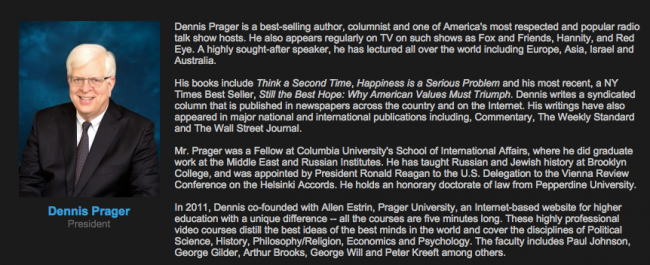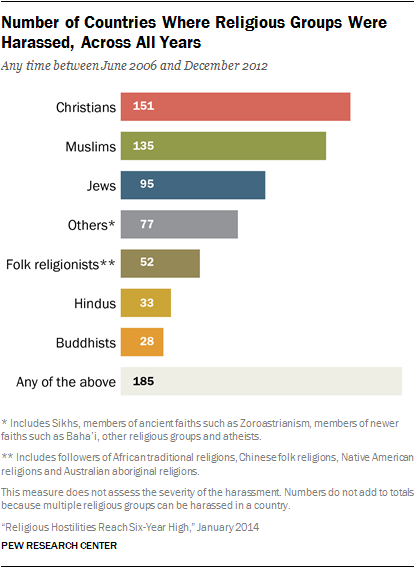Yes, Christians Are The World’s Most Persecuted Minority

WHO are the world’s most persecuted minoroty, asks “Middle East expert Raymond Ibrahim thinks he knows:
One hundred years ago, 20% of North Africa and the Middle East, the birthplace of Christianity, was Christian. Today, Christians make up 4% of the population. Much of that decline has occurred in the last decade. In essence Muslims are rendering North Africa and the Middle East free of Christians.
Take Egypt, for example, my ancestral homeland. In just the past two years, tens of thousands of Christian Copts have left Egypt. And many others want to leave, but they simply cannot afford to. Why they want to leave is no mystery.
On New Year’s Day 2011, the Two Saints Church in Alexandria was bombed, leaving 23 Copts dead and 97 injured. In recent years dozens of Coptic churches have been attacked, many burned to the ground. In August 2013 alone, the Muslim Brotherhood and its supporters attacked and destroyed some 80 churches.
Unfortunately, Egypt is more the rule than the exception.
Hundreds of Nigerian churches have been destroyed in recent years, with especially deadly attacks reserved for Christmas and Easter church services, leaving dozens dead or mutilated. Churches have been bombed or burned in Iraq, Syria, and just about every place in the Middle East where churches still exist except Israel. Christian businesses have been torched, Christian girls have been kidnapped, sold as child brides or slaves, and had acid thrown in their faces for not being veiled. Anyone born a Muslim who converts to Christianity faces jail and possibly execution. The list of fresh atrocities by Muslims against Christians grows longer almost every day. Even in Muslim countries often portrayed as “moderate” — Morocco, Indonesia, Malaysia, Kazakhstan, Uzbekistan — Christian minorities are under legal pressure not to build churches or evangelize.
He looks to Israel as an example:
Because Muslim persecution of Christians throws a wrench in the media’s narrative that “Muslim violence is a product of Muslim grievance.” That grievance is, first and foremost, portrayed as the sin of European colonialism and alleged American imperialism. In the Muslim world’s mind, those two sins are personified by the Jewish State of Israel, a nation the Muslim world believes was forced upon it by the colonial powers of Europe following World War II and is currently supported by the United States.
Much of the Western world and the Western media have largely bought at least some of this narrative. Here’s how it works: Because Israel, with the backing of the United States, is stronger than its Muslim neighbors, the media, while not defending Islamic terrorism, often portray terror against Israel, America, and even Europe as the actions of understandably angry “underdogs” fighting for what they deem “justice.” But what happens to this media narrative when Islamic terror is directed against a minority weaker than them–in this case, the millions of indigenous Christians throughout the Islamic world?
The answer is that, rather than abandon this narrative, the media just don’t report Muslim persecution of Christians except for the most sensational cases. That’s why you probably don’t know that there are barely any Christians living in Algeria, Tunisia and Libya, nations where Christianity once thrived. Or, that this is happening in Egypt, Iraq, Iran, and even Lebanon.
So, yes, Christians are indeed the most persecuted religious group in the world today. But reporting it would violate the media’s narrative of Christians as persecutors and Muslims as victims.
Raymond Ibrahim lectrues at Prager University.
A quick looks reveals no obvious Muslims on the group’s board or teaching staff.
On Dennis Prager’s website, we learn:
More than anything else, Dennis loves teaching Torah – the Five Books of Moses of the Hebrew Bible. Whatever your faith, or even if you have none, you will experience through these courses the true power of this enduring text – the most important words ever written.
So much for the messenger. But what of the message?
Prince Charles sees an issue:
“It is an indescribable tragedy that Christianity is now under such threat in the Middle East – an area where Christians have lived for 2,000 years, and across which Islam spread in 700 AD, with people of different faiths living together peaceably for centuries. It seems to me that our future as a free society – both here in Britain and throughout the world – depends on recognising the crucial role played by people of faith.”
On the HuffPost, Kelly James Clarke wrote in 2013:
In early November, German Chancellor Angela Merkel declared that Christianity is “the most persecuted religion in the world.” Although met with predictable criticism, Rupert Short’s recent research report for Civitas UK confirms Merkel’s claim — we may not want to hear it, but Christianity is in peril, like no other religion. While this is a contest no one wants to win, Short shows that “Christians are targeted more than any other body of believers.” Short is the author of the recently published Christianophobia: A Faith Under Attack. He is concerned that “200 million Christians (10 percent of the global total) are socially disadvantaged, harassed or actively oppressed for their beliefs.”
Christianity is facing elimination in its Biblical homeland. Between a half and two-thirds of Christians in the Middle East have departed or been killed over the past century. Short attributes the intolerance and violence towards Christians to the rising Islamicization of Middle Eastern countries. Some of the oppression is government sanctioned and some government permitted; most is government ignored.
Short looks at the plight of Christians in the Middle East, country by country. When it comes to religious oppression, the devil, one might say, is in the details.
In the Salafist website, ‘Guardians of the Faith’, you can read that Muslims are superior to Egypt’s Coptic Christians because “Being a Muslim girl whose role models are the wives of the Prophet, who were required to wear the hijab, is better than being a Christian girl, whose role models are whores” and “Being a Muslim who fights to defend his honor and his faith is better than being a Christian who steals, rapes, and kills children.” Little wonder, then, that radical Muslims unleashed their fury on Christians in 2010, murdering 13 worshippers as they emerged from a service and later bombing a church in Alexandria which killed 20 and injured 70. We can only hope that Morsi’s new government will see fit to stem the rapidly increasingly violence against Coptic Christians.
Pew seems to back that up:

Restrictions, harassment, and intimidation towards people who practice their religion increased in every major region of the world in 2012 except the Americas, with Christians the major target, says a new report [2012] by the Pew Research Center.
“Muslims and Jews experienced six-year highs in the number of countries in which they were harassed by national, provincial or local governments,” the study found, but Christians continue to be the world’s most oppressed religious group, with persecution against them reported in 110 countries.
Andrew Brown heard British Prime Minister David Cameron state “Christianity is the most persecuted religion in the world today“:
Some statistics of Christian persecution are inflated, but the reliable ones are shocking enough. Around the world tens of thousands of people (at least) are in peril of their lives just for being Christians. In the last century hundreds of thousands were killed for it by regimes that wanted to extirpate religion altogether. This didn’t work very well. In China, for example, queries about God and Christianity far outnumber those on Chairman Mao on their equivalent of Twitter. But it was profoundly wicked as well as ineffectual.
This persecution continues today. The question is what the British government can actually do about it. In the Middle East there is nothing we can do. The war in Syria and the turmoil in Iraq are completely out of our control. The oppressive peace in Saudi Arabia and Bahrain, and indeed all the Gulf states, entails monstrous injustices towards religious minorities, Shia as much as Christian. But there is little that any British government can do and it is reluctant to influence the policies of richer and friendly states.
Nelson Jones considers:
To some extent, however, the high figure for Christians is an artefact of the statistics. Christianity is the world’s largest religion by number of adherents, so it shouldn’t come as too much of a surprise to discover that the largest number affected by what might be described as persecution are Christians. That would be the case if members of all religions were equally affected by persecution. By the same logic, one would expect Muslims to be the second most persecuted group. And so Pew discovered: Muslims suffered harassment or restriction in 131 countries worldwide.
It’s almost certainly not the case that Christians are the most “persecuted” religious group in proportion to their numbers. Rather, they suffer along with other minority groups from, to take the most obvious example, the increasing prominence and, in some countries, power of strains of Islam that are uncomfortable with the very notion of religious pluralism. So, to an equal or even greater extent, are Muslims belonging to minority sects, such as the Shia in Saudi Arabia or the Ahmadi in Pakistan. Persecution against the Ahmadis, a sect not regarded by some orthodox as Muslim at all, has spread even to Britain, where recently a local newspaper in Luton was prevailed upon to apologise for the “hurt feelings” of Muslims after it carried an advertisement from the Ahmadi community.
What to do?
Posted: 10th, November 2014 | In: Reviews Comments (3) | TrackBack | Permalink


